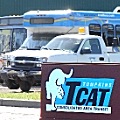- By Patty Poist
- Around Town
 Print
Print  TCAT is asking local citizens in Tompkins County to contact their congressional leaders to renew funding for the federal transportation bill, Moving Ahead for Progress in the 21st Century Act (MAP-21), which is set to expire on May 31, 2015.
TCAT is asking local citizens in Tompkins County to contact their congressional leaders to renew funding for the federal transportation bill, Moving Ahead for Progress in the 21st Century Act (MAP-21), which is set to expire on May 31, 2015.With the future of America's public transportation and road network in jeopardy, TCAT on Thurs., April 9 is joining transportation and community leaders from across the country for "Stand Up for Transportation Day" by enlisting help from is passengers and local residents. Sponsored by the American Public Transportation Association (APTA), with support from national and local partners from various transportation modes, business and community oriented interests, is urging communities across the country to ask their federal officials to support the passage of a long-term, sustainable and reliable federal transportation funding bill.
According to a recent report from the APTA, if MAP-21 does expire, TCAT and transit agencies across the country are at grave risk of not having an adequate and predictable funding stream, particularly needed to replace aging transit fleet and facilities.
On the national level a new analysis from APTA shows that more than $227 billion in economic productivity is at risk to the nation's economy over the next six years without long-term federal investment in public transit.
"I am deeply concerned about the uncertainty we face without long-term, sustainable investment for our system," said TCAT Acting General Manager Alice Eccleston. "Without a long-term federal funding bill, it is impossible for us to plan for the future, even as we struggle to keep our transportation services in a state of good repair. TCAT strongly urges the U.S. Congress to restore a new multi-year authorization bill that provides dedicated funding through the Highway Trust Fund to help grow our local economy."
Eccleston expressed her deep appreciation to a local contingent made up of TCAT Board Member Bill Gray, Chair of the TCAT Board's Budget Committee; Joel Malina, Cornell University's Vice President, University Relations; Ithaca Mayor Svante Myrick, and Tompkins County Administrator Joe Mareane. On March 11, the four traveled to the nation's capital to meet with federal lawmakers in Congress, key policymakers, as well as New York Gov. Andrew Cuomo's Washington, D.C office to advocate on behalf of TCAT. Dianne Miller, Cornell University's governmental liaison in Washington helped schedule a series of meetings with representatives from the offices of U.S. Sens. Chuck Schumer and Kirsten Gillebrand as well as U.S. Reps. Tom Reed, Richard Hanna and John Katko, the governor's D.C. office, as well as officials from the Federal Transit Administration.
TCAT's annual ridership in 2014 stood at approximately 4.3 million annual trips, an exceptionally high ridership rate in a county with a population of 102,000, Eccleston noted.
"For TCAT to continue its success in a transit-intensive community, we need to have stable funding," Eccleston said. "We are fortunate to have a local delegation of dedicated leaders who took time to go to Washington on March 11 at which time they spent a very long day in in face‑to‑face meetings with key officials to tell TCAT's story and to advance our cause in gaining adequate and predictable funding," Eccleston said.
The American Public Transportation Association reports that the nation faces a $160 billion backlog just to bring public transit and road systems into a state of good repair. The lack of a long-term federal funding bill creates local funding uncertainty which jeopardizes transportation project planning and discourages private sector investment. With a lack of a commitment on the federal level, that stifles local business investment and job creation, APTA said.
Eccleston said that TCAT will need 33 replacement buses over the next five years and, at present, has funding for only nine. In addition, TCAT has capital needs for technology improvements as well as facility upgrades.
"TCAT is an integral part of the local economy; we create jobs and boost economic development right here in Tompkins County," Eccleston said. "TCAT is essential to the overall well‑being of Tompkins County and provides a vital service for people from all walks of life."
TCAT Board of Directors Chairman Frank Proto applauded APTA's efforts at organizing "Stand up for Transportation Day." He noted that APTA selected TCAT as the best transit system of its size in 2011 and that adequate and reliable funding is necessary to maintain the quality of service that led to that honor.
"As our main national organization we're hopeful that APTA can get the message across that transit systems both locally, and nationwide, are suffering from the lack of federal capital money support," Proto said. "At TCAT, our need is critical to replacing our aging fleet in order to continue delivering the superior service that won us national recognition."
v11i14



